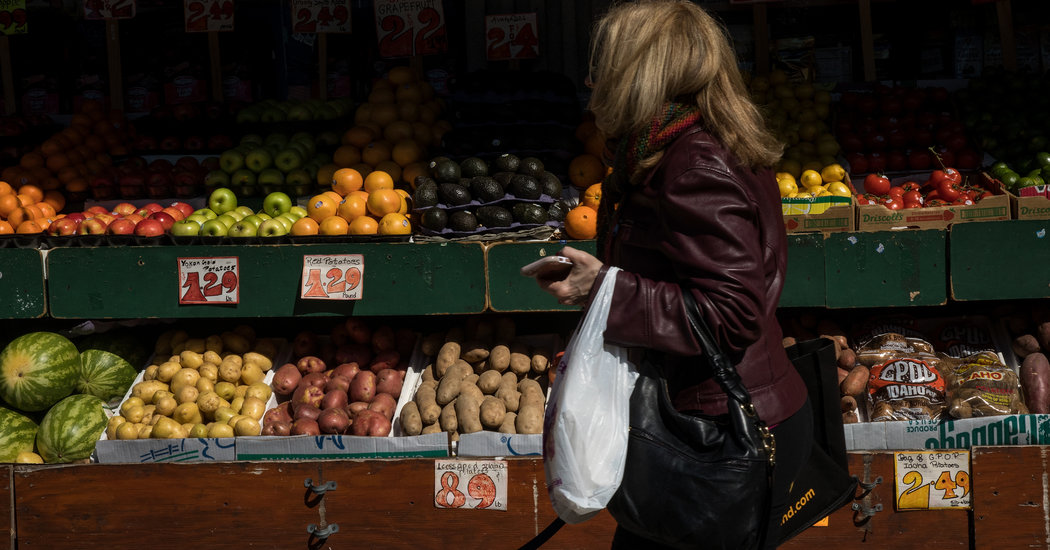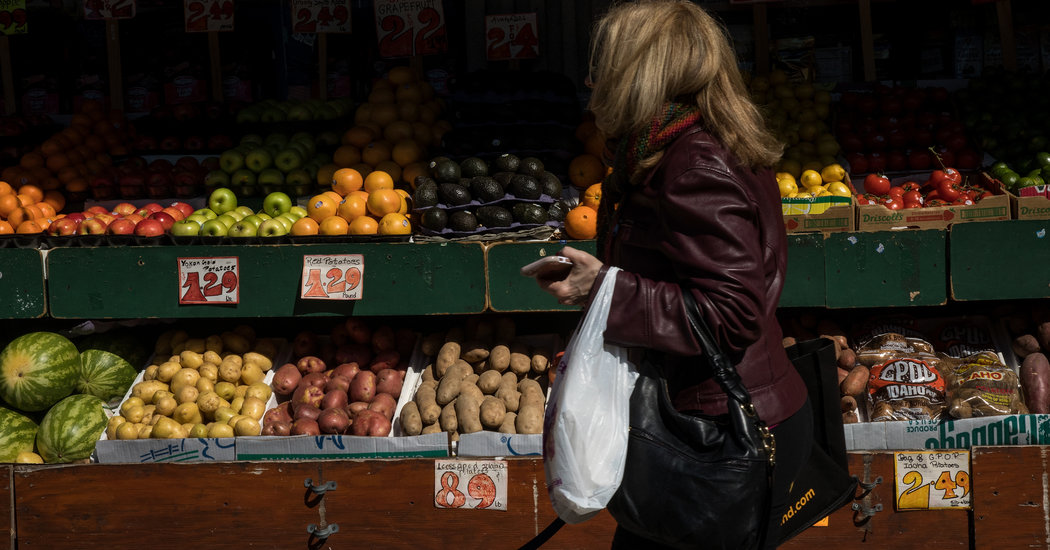
[What you need to know to start the day: Get New York Today in your inbox.]
The plastic bag ban plan is back.
Gov. Andrew M. Cuomo said Sunday that he would push for a statewide ban on single-use plastic shopping bags as part of his 2019 budget plan, which he will introduce in Albany on Tuesday.
Efforts to regulate the bags in New York have been discussed for years; the governor first proposed legislation to prohibit the ubiquitous bags last April. That bill, which stalled in the Republican-led State Senate, came more than a year after Mr. Cuomo and the state Legislature blocked a 5-cent fee that New York City officials wanted to impose on the bags.
As plastic bags have polluted sidewalks, landfills and waterways, bans on the bags have become a hotly debated issue. Several New York municipalities have shopping bag laws, following dozens of local governments across the country in adopting bans, fees or a combination of the two.
But details about Mr. Cuomo’s proposal were scant on Monday, raising questions about its potential impact.
What exactly is the governor proposing?
In a statement on Sunday, the governor’s office said Mr. Cuomo would propose to ban “single-use plastic bags.” It did not provide a specific definition, but the language suggested that Mr. Cuomo would be targeting the plastic bags that retailers give to customers.
The bill that he introduced last year offered a variety of exemptions from the ban, including bags that contained raw meat, fish or poultry; bags used for bulk packaging of fruit and dried goods; takeout food bags used by restaurants; and newspaper bags. It was unclear whether those exemptions would remain in Mr. Cuomo’s proposal this year.
What’s the problem with single-use plastic bags?
Most of the bags are not biodegradable, and they can end up littering the streets, hanging in trees or polluting waterways, said Eric Goldstein, the New York City environment director for the Natural Resources Defense Council.
Like plastic straws, which have also come under scrutiny, the bags contribute to the massive quantity of plastics in the ocean.
In 2016, a report by the World Economic Forum suggested that by 2050, the world’s oceans would contain more plastic by weight than fish. As the plastics break down, they release toxic chemicals, threatening marine life.
Also, Mr. Goldstein said, the bags are generally not recycled. Even when they are sent to recycling facilities, they are so thin that they can jam equipment, slowing the recycling process and making recycling more expensive.
In his statement, Mr. Cuomo said his proposal would “reduce litter in our communities, protect our water and create a cleaner and greener New York for all.”
What about paper bags?
In his statement, Mr. Cuomo did not address carryout paper bags, which he did not propose to regulate in his bill last year.
Because of that, some lawmakers and environmental groups cautioned that this year’s measure may not go far enough to address waste and pollution problems.
Lawmakers who suggest bag fees or bans are generally trying to steer consumers toward bringing reusable bags when they shop. But Jennie Romer, a lawyer and sustainability consultant who works with legislators on bag laws, said that when people were presented with paper as a no-cost alternative to plastic bags, they would generally take it.
“We’ve learned from experience that if you just ban plastic, an unforeseen consequence is that paper bag use increases,” Ms. Romer said.
Paper has its own environmental impacts. Aside from the use of raw materials, Mr. Goldstein said, the paper production is an energy-intensive process that generates air and water pollution. Additionally, paper bags are heavier than plastic bags, and transporting them involves greater use of fossil fuels.
Food retailers have also expressed concerns over legislation that does not address paper bag use. Mike Durant, the head of the Food Industry Alliance of New York State, said a plastic bag ban alone would put pressure on retailers, because it costs more to store and transport paper bags.
A bill introduced by State Senator Todd D. Kaminsky, a Democrat from Long Island who chairs the Senate’s Environmental Conservation Committee, proposed supplementing a ban on plastic bags with a 10-cent fee on paper bags.
On Twitter, Senator Liz Krueger, a Democrat from Manhattan who tried for a plastic bag ban in 2018, also called for a paper bag fee:
Have other places tried this? How’s it going?
If Mr. Cuomo’s measure is enacted, New York would become the second state, after California, to impose a ban on single-use plastic shopping bags. Hawaii also has a de facto ban on the bags because all of its counties have banned them.
In addition, many municipalities, including large cities like Chicago and Washington, have imposed fees on bags given to customers at retail stores.
Washington’s 5-cent fee on paper and plastic bags went into effect in 2010. City officials have said the law drastically reduced consumption of disposable bags there, and a foundation that monitors trash in Washington’s waterways said it found a 72 percent decrease in the number of plastic bags being removed during cleanup efforts.
Chicago passed a ban on thin, lightweight plastic bags in 2015, then repealed that law in 2016 and replaced it with a 7-cent fee on paper and plastic. A 2018 study from researchers at the University of Chicago and New York University said disposable bag use in the city was down 40 percent.
Globally, countries including Israel and Ireland also have fees on plastic bags. In Israel, the government said disposable plastic bag use went down 80 percent at supermarket chains in the year after the law took effect. In Ireland, plastic bag use dropped 94 percent just weeks after the country adopted its tax in 2002.
Wait, didn’t New York City already try to enact a fee?
Yes. In 2008, then-Mayor Michael R. Bloomberg called for a 6-cent fee on plastic bags. He dropped the proposal after it faced fairly strong opposition.
In May 2016, the City Council narrowly voted to approve a 5-cent bag fee. But a coalition of state lawmakers stepped in, saying that the bag fee amounted to government overreach and that it would put an undue financial burden on poor New Yorkers.
The group introduced a bill to stop the city from implementing its fee. The legislation passed, and Mr. Cuomo signed it into a law. At the time, the governor said that the city’s law was “flawed,” and that it would have allowed merchants to keep the 5-cent bag fee as a profit.
After he halted the city’s action, the governor set up a task force, which issued a report last January. The report presented eight possibilities — including a plastic bag ban and fee scenarios — and outlined the concerns over paper bags.
All the while, other New York municipalities enacted bag fees. Suffolk County on Long Island approved a 5-cent fee on paper and plastic bags that took effect last January. The city of Long Beach in Nassau County, also on Long Island, approved a 5-cent fee on plastic bags that began in 2017.

